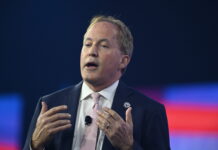By Sarah Holliday
The Washington Stand
There’s a growing list of states adopting universal school choice, and Louisiana is the most recent addition. “The LA Gator Program puts parents in the driver’s seat and gives every child the opportunity for a great education,” said Louisiana Governor Jeff Landry (R). “When parents are committed to the value of their child’s education, government should never get in the way.” And it seems many of these parents are moving to homeschooling to ensure their children are getting a well-rounded, trustworthy education. This, however, has received pushback.
The editors of Scientific American magazine published an article last month claiming “children deserve uniform standards in homeschooling.” And what does this look like? The idea the SA editors had in mind is that “homeschool parents could be required to pass an initial background check, as every state requires for all K-12 teachers.” SA is concerned that the growth of homeschooling is a “problem” since it’s hard to keep track of how many children are being homeschooled these days. “Some children may not be receiving any instruction at all,” they wrote. “In the worst cases, homeschooling hides abuse.”
But for education experts like Moly Macek of the Mackinac Center for Public Policy, the article is a false alarm. The “venerable magazine’s call for restrictions isn’t based on science,” she wrote. Macek continued, “Most would find it hard to argue with the editors’ opening argument that ‘children deserve a safe and robust education.’ But they go on to use this as the reason that homeschooling should be tracked and regulated in the U.S. This conclusion just doesn’t hold water based on the evidence from studies they cite.”
Family Research Council President Tony Perkins considered SA’s push against homeschooling on Thursday’s episode of “Washington Watch” with Mike Farris, founder of the Home School Legal Defense Association. Perkins asked, “[W]hy is the Left so threatened by parents leading their children’s education?” And more specifically, how should we respond to it all? Farris replied, the “editors of the Scientific American need a basic course in constitutional law.”
He continued, “The federal government has no jurisdiction to implement the kind of plan that they are calling for,” which happens to be “a very draconian plan.” Ultimately, it seems “their motive and their operational plan … would be just, on its face, unconstitutional.” Farris pointed out that one of the reasons for their argument is that parents who choose to homeschool often “teach their kids about creation as opposed to evolution,” which “is something, clearly, that people have the right to do.” And so, he added, for the editors of SA to have a problem with that says a lot about their motivations.
“It’s almost laughable,” Perkins noted. He recalled the editors’ call for parents to undergo background checks. “[A] background check?” he hooted, “to teach your own children?” Farris concurred, stating it’s “amazing” how parents can be with their children all day, “but if you want to teach them about math and reading and science in the Bible, then you have to have a background check. It just doesn’t make any sense.”
Farris also drew attention to the concern SA highlighted about children being abused. As he explained, there are unfortunate cases of homeschool children who are being “seriously abused.” However, “The reality is, in the vast majority of cases like this … the government officials knew about the problems with the family long before there was ever any claim to be a homeschooling family.” And so, when a homeschooling family gets caught up in abuse accusations, it’s often the case that “the officials use that as a cover up for the fact that they failed to do any reasonable inquiry into the family when they first found out about the problems.”
Farris went on to explain the harsh reality of how “the number of cases of sexual abuse of children by public school teachers dwarfs the number of any claim relative to homeschooling, just in sheer volume of numbers. … It’s just far, far greater.” They also claim, Perkins added, that homeschool “kids are being educationally deprived.” But if you look at the statistics and “the test scores from the public schools in the last few years,” the scores are the lowest they’ve been in decades in both math and reading.
“The reality is,” Farris urged, “homeschooling works very, very well.” He went on, “[P]eople say that the test scores are not conclusive. [But] they’re conclusive of this: that homeschooling performs adequately. That’s absolutely conclusive. I think that the test scores also show that homeschooling is the best form of education.” And while he acknowledged there’s “more debate that could be made about that” final claim, he reasoned that homeschooling parent’s “don’t have to prove that we’re the best. We just have to prove that we’re at least as good as the public schools.”
Perkins also emphasized that, “given the woke ideology that’s invaded schools,” it’s becoming less and less difficult to prove that point. “But at the bottom line of this … is [that] it’s a clash of worldviews.” And more specifically, it’s a “hatred for a biblical worldview.” Farris agreed, noting a common reason opponents give is “they want all children in America to be indoctrinated in their worldview, not the parents’ worldview.”
Perkins raised the question: When “parents make that type of investment in their education by homeschooling them,” what are the practical benefits? According to Farris, the reason most parents choose to homeschool is because “children get their values from whoever they spend the majority of their time with.” As such, parent’s want their children to embrace their values. As Farris detailed, “[O]ur kids are not cookie cutters of either [my wife] or I in any respect, but they share all of our core values about God … the Bible … America … freedom … [and] the principles of protecting human life. We’ve effectively transmitted our values to our kids, and they’ve turned out just fine academically.”
Not to mention, he added, “We have a very close family. We have consistent values. We have high academic achievement. I can’t ask for anything better. And it’s just the best thing we ever did for our family.” Perkins emphasized, “Homeschool families are close, and when we talk about close,” it’s because “they stick together. … [T]here’s a bond that takes place through that process of learning about life together.”
Given this reality, Perkins clarified that an attack such as what’s coming from SA isn’t new. But “what do we need to do to make sure we don’t lose this God-given right to teach our own children?” For Farris, it’s about staying “nimble and organized.”
He discussed how a lot of people reasonably worry about their children’s schooling, which gives homeschooling families an opportunity to show how great of a practice it is. Homeschooling brings a “kind of assurance and affinity,” he concluded. “I think we’re in a really strong position. We just got to keep putting the pedal to the metal and not letting any lackadaisical spirit come in. We got to defend our liberty day in, day out.”

















